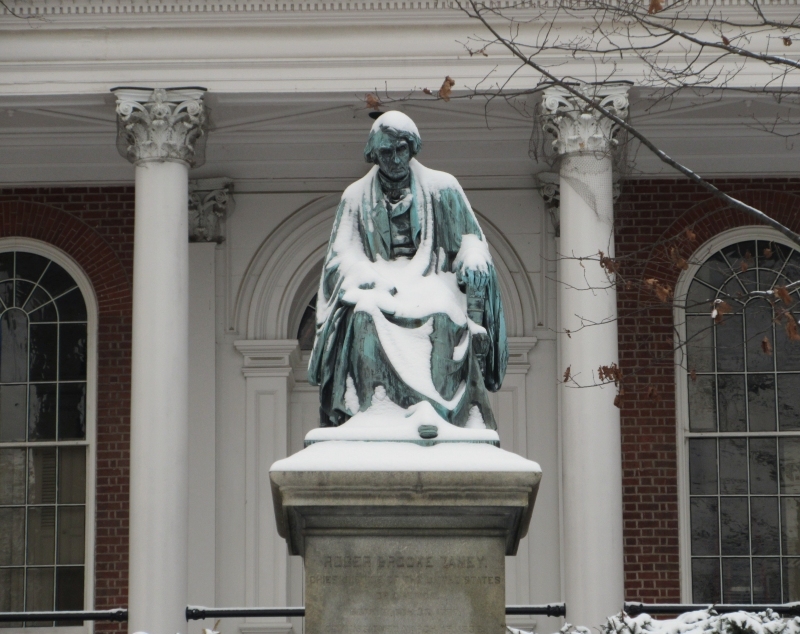The words to “Maryland, My Maryland,” composed by an emotionally wrought Rebel sympathizer, James Ryder Randall, are despicable.
Abraham Lincoln is called a despot. Those supporting the United States rather than the Confederacy are called “Northern scum.”
The poem is a blatant call for Maryland to separate from the U.S. and join the Confederacy.
It’s a blood-thirsty state anthem, written in New Orleans by the 22-year-old Randall following the first casualties of the Civil War during Baltimore’s Pratt Street riot of April 1861.
Rebel call to arms
Thus the words:
“Avenge the patriotic gore
That flecked the streets of Baltimore,
And be the battle queen of yore, Maryland! My Maryland!”
Randall, who spent most of his adult life in Augusta, Georgia, and other Southern outposts as an editorial writer—far from Maryland—quickly became a hero among Southern separatists.
His words, set to a catchy German college tune that we know today as “O Tanenbaum” or “O Christmas Tree,” caught on with Rebel soldiers and supporters.
Why such mean-spirited and hostile words would come to represent the state of Maryland—whose citizens were decidedly mixed in their views of the Civil War—remains cloaked in mystery.
Adopting a state song
Republican Gov. Harry Whinna Nice vetoed a bill making Randall’s lyrics the state song in 1935. He felt the words were inappropriate. Nice was on the mark.
But the next governor, conservative Democrat Herbert R. O’Conor, went along with legislators, especially those from rural parts of Maryland with Southern sympathies. O’Conor signed the bill making “Maryland, My Maryland” the state song in 1939.
Big mistake.
Other states have dumped offensive lyrics in their state songs. Florida did it twice (“Swanee”), Kentucky did it (“My Old Kentucky Home”) and so did Virginia (“Carry Me Back to Old Virginny”).
Yet for 20 years, Maryland legislators have refused to get rid of lyrics that don’t come close to representing the state’s citizens. The words are hateful, viciously un-American and written to encourage Maryland to secede from the United States.
It is past time to reverse that dreadful decision by the 1939 General Assembly and Governor O’Conor.
Correcting a mistake
This is not, as Gov. Larry Hogan, Jr. put it recently, “political correctness run amok.”
He needs to re-think his position. Randall’s lyrics never should have been allowed to represent Maryland’s citizens. Does Hogan really want school children singing those words?
Hogan is right that the “PC Crowd” frequently careens out of control trying to revise history to further their own current-day ideological goals.
Taken to an extreme, this would mean tearing down the Washington Monument and re-naming the District of Columbia because George Washington owned hundreds of slaves, frequently ordered severe whippings and refused to liberate them until after his death.
It would mean tearing down the Jefferson Memorial and removing Thomas Jefferson’s face from American currency because he, too, owned hundreds of slaves and conceived children with them.
It would mean melting down the austere statue of Roger Brooke Taney on the grounds of the Annapolis State House because of his refusal as Chief Justice of the Supreme Court to abolish slavery. Taney’s other sensible and forward-thinking Supreme Court opinions, and his extremely important work in Andrew Jackson’s Cabinet, would be ground into dust.
Byrd Stadium no longer
The PC Crowd already had its way at the University of Maryland, College Park, where the name of Harry C. Byrd was erased from its football stadium—even though Byrd, who tried vigorously to keep Negroes out of University of Maryland campuses, arguably did more to turn UM into a first-rate state university than any of his successors.
“You can’t change history, and we’re not going to be able to rewrite history,” Hogan said. That’s true. The past is water under the bridge, it is time that already has ticked off the clock.
We can, though, learn from mistakes of the past. We can glean a greater understanding of the flawed decisions of former leaders and why those mistakes happened—so that we, in the present, don’t make similar mistakes.
As philosopher George Santayana wrote in 1924, "Those who cannot remember the past are condemned to repeat it."
Lessons from yesterday
Hogan should learn from O’Conor’s mistake in 1939. He should review and learn from Nice’s courageous veto in 1935.
There’s nothing sacred about a state song, especially one that fiercely and savagely promotes secession.
It makes sense to follow the suggestion of an advisory panel to replace Randall’s odious lyrics with words that better represent Maryland’s history and its citizens’ good intentions.
Overturning a legislative and gubernatorial mistake made 77 years ago isn’t a matter of political correctness.
It’s common sense that ought to be supported on a bipartisan basis in the State House.
Barry Rascovar’s blog is www.politicalmaryland.com. He can be reached at brascovar@hotmail.com



